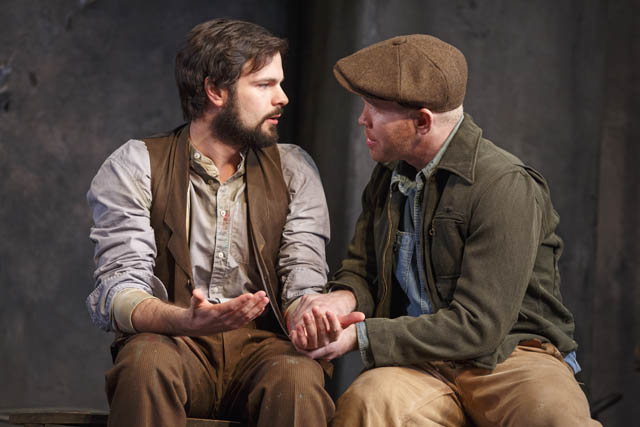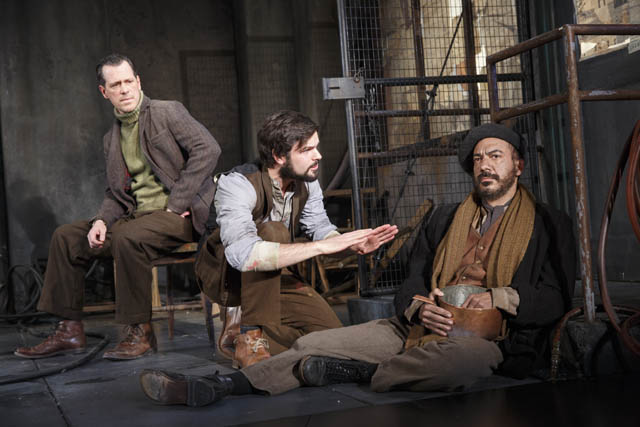

Continuing to prove why he’s one of the best actors of his generation, the versatile Jonny Orsini went from the madcap comedy of Larry David’s Fish in the Dark, to the powerful drama of Arthur Miller’s Incident at Vichy (playing at the Signature Theatre through December 20). Directed by Michael Wilson, the play unfolds during a single day in WWII France, on which nine strangers find themselves detained in a Nazi jail without just cause. Some are fearful, others remain nonchalant, but none of them are able to deny there is something larger at play behind the closed doors of the Nazi officers.
Orsini plays Lebeau, a sensitive painter who often serves as moderator between the other men who let the pressure escalate, but even he has his demons. Towards the end of the play he delivers a devastating monologue about methods of coping with reality. We had the opportunity to talk to Orsini about playing such a complex character, his research, and the role of art in times of chaos.
What a treat to sit in a theater and see a play about ideas...
Absolutely! That’s one of the things why I was so drawn to this, and also it’s not every day that you get to do an Arthur Miller play, nevermind one of his lesser known plays. It was such a privilege.
I’ve seen three productions of Arthur Miller’s work in the last month or so, and am in awe of how timely they all seem. Do you remember your first encounter with Miller’s work?
I think my first experience with it was actually seeing Daniel Day-Lewis in The Crucible film, to be honest with you. Again, I didn’t come from a theatre background as a kid, I don’t know if this makes me sound less literary, but that was my first.
Movies are always a good place to encounter theatre if you’re not in New York.
I was from a small town in Connecticut, it’s not like I was denied things, but I didn’t have access and wasn’t encouraged as much in the way I grew up. I’ve made up for it in every way I can, because it’s my passion. That’s the power of movies, they can reach a larger audience, we talked about this already when PBS gave us the gift of making a film of The Nance. By putting it on the medium it was able to reach my people.
Is John Proctor a Miller character you want to play then?
I’m open! But yes, absolutely. I saw the Ivo van Hove A View from the Bridge, which was amazing, Mark Strong was just unbelievable! I don’t know what guy would see that and not want to play Eddie. I’d be open to any part from that play. Miller is similar to Shakespeare in that it’s almost like being in the play, in a way it doesn’t matter what character you’re playing. Even when there are clearly defined lead roles, it’s more about the ideas and the ensemble working together, which is what I love most about our play. It’s not about any individual character, it’s essentially about these beautiful, complicated ideas and how to get them out so people can think more about themselves and humanity.
I noticed in Vichy, Bridge and Death of a Salesman that Miller seems to be fixated on chairs and people sitting around…
Yeah, because it’s all about the ideas, which is why van Hove’s production is so interesting, because he takes away all the props and what you hear is the language and see the beautiful movements from the actors. You just reminded me though, that my first stage experience of seeing Miller was Philip Seymour Hoffman in Death of a Salesman, of course I knew about Miller and by the time I got to college I’d read his plays, but the first time I saw a full stage production was the 2012 production and needless to say, I was blown away by that. It was very powerful.
I know you do a lot of research on your characters, did you have any specific points of reference for this one? For some reason I kept thinking about Casablanca.
Absolutely, first of all, Michael Wilson, and our dramaturg Jenna, made this incredible packet they gave us on our first day of rehearsal. It had news articles and all sorts of material all pertaining to the time period and to every historical reference in the dialogues. Not only is that incredible for the hours of work it took them to compile this, but also because it put us all on the same page, we are all digesting the same information and all have a point of reference for the locations and ideas in the play. I remember also when I did Othello with Barry Edelstein, he did something similar with a map. Even in that sense, it can be something so simple, but to have the whole company together coming from the same place can be very helpful. It was really crucial that we got this right, the Holocaust is obviously well documented, but the fact that this took place in France and the French got out of the way of the Nazis and helped them, is quite horrifying and a lesser known part of the history.

How is the preparation work with the ensemble? This is the kind of play where I can see heated debates happening during rehearsal.
All the ideas came up, what was fascinating is that it didn’t lead to debate, but more like a passionate “yes and” conversation every day, part of that was that Arthur takes the part of every point of view in the situation. Essentially all the prisoners stuck in this place all have a point of view about why this could be possible, or how there’s no way this atrocity could be happening...everyone has a different idea and Arthur makes all of them completely valid. It’s unbelievable how he’s able to do that. All of us, as a company, were able to understand where everyone was coming from.
Your character says “it gets tiring to believe in the truth”, do you find that in order for the world to make sense one must often delude oneself?
Well this is obviously getting into personal philosophy and I think you always have to look it in the face. I am absolutely understanding of people who delude themselves, through certain types of religion or whatever they do to get through the day, I would never judge people based on that as long as they’re not hurting someone else. I personally have never been comfortable with this because there’s always a nagging in the back of my head where I know that something is not being addressed, I need to face it, even if it’s to my own detriment.
Since Lebeau in Incident at Vichy is a painter and the Prince is a patron of the arts, obviously Miller was very self conscious about the role of art and he raises questions about whether we should allow art to exist in a world in distress. Should art be made during times of war, or is art in fact what helps us open our eyes?
That’s a very astute observation. A lot of the different characters are coming from different art backgrounds, the Prince is also an amateur musician, again like you’re saying, they wonder what role art should play. I took art history in college and I’ve always been interested in it, I mean how could you not. Even if you don’t feel like you understand painting it’s always nice to go to MoMA or the Whitney and see what happens just by looking at things. When you’re a logical thinker it’s hard to turn off the part of your brain that tries to make sense of everything, but that’s been an amazing part of the process for me too. I’ve spent so much time with painting in order to understand my character better, just trying to decide what kind of painting I do, and what my influences are...I have a friend, Julie Garfield, she’s an actor, acting teacher and also a painter, so I talked to her and she guided me towards who I would be looking up to at the time. I also spent time figuring out who me, Jonny, would identify with in order to determine what my own influences would have been.
Incident at Vichy is now playing at the Signature Theatre. For tickets click here.